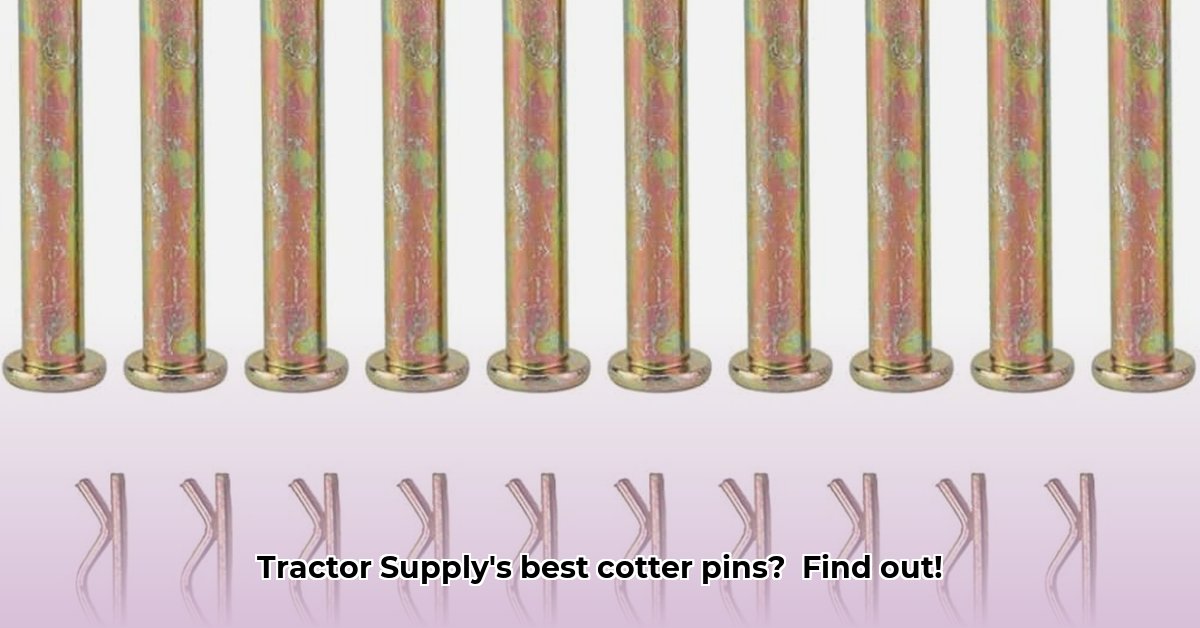
Cotter Pins and Sustainable Farming: Small Parts, Big Impact
Cotter pins might seem insignificant, but their role in maintaining farm equipment significantly impacts sustainable agricultural practices. Choosing the right cotter pins ensures equipment longevity, minimizing waste from frequent replacements and maximizing operational efficiency. This translates to significant cost savings and reduced environmental impact. This guide explores how selecting, using, and maintaining cotter pins from Tractor Supply contributes to a more sustainable farm.
How can choosing the right cotter pin improve the sustainability of your farm operation? The answer lies in reduced downtime, extended equipment lifespan, and minimized resource waste. A seemingly small detail like a cotter pin directly affects overall farm efficiency and environmental impact.
Did you know that a single faulty cotter pin can lead to equipment failure, resulting in significant crop losses and wasted resources? This highlights the importance of selecting high-quality, appropriately sized cotter pins for all your farm equipment.
Selecting the Right Cotter Pin: Material, Size, and Application
Choosing the right cotter pin requires careful consideration of material, size, and application. Selecting an incorrect size or material can lead to equipment failure, increased maintenance costs, and even safety hazards.
Material: The choice of material directly impacts durability and longevity. Stainless steel offers superior corrosion resistance, ideal for outdoor applications exposed to the elements. Galvanized steel provides a cost-effective alternative with decent rust resistance. Consider the specific application and its exposure to moisture and other environmental factors to make an informed choice. Brass may be preferred in specialized situations.
Size: Precise measurements are paramount. Using calipers, accurately measure the existing cotter pin's diameter and length before purchasing replacements. A pin that is too loose can easily slip out, causing equipment failure, while a pin that's too tight can damage the equipment.
Application: The intended use of the cotter pin dictates the material and size choices. Heavily stressed components require stronger, more durable pins. Consider high-quality stainless steel for those applications. For less demanding uses, galvanized steel or other alternatives can be suitable.
Sustainable Farming Practices Enhanced by Cotter Pin Selection
The seemingly minor detail of cotter pin selection directly influences several key aspects of sustainable farming:
Reduced Water Waste: Proper functioning irrigation systems are crucial. Ensuring all cotter pins are in good working order minimizes leaks and malfunctions that can lead to significant water waste.
Improved Equipment Lifespan: Regular maintenance, including replacing worn cotter pins, significantly extends the operational life of farm equipment. This avoids premature replacements, saving resources and money. "Regular maintenance, including checking cotter pins for wear and tear, is critical to maximizing the lifespan of your farm equipment," says Dr. Emily Carter, Agricultural Engineer at the University of California, Davis.
Minimized Crop Losses: Well-maintained machinery ensures efficient harvesting, minimizing crop damage and losses throughout the process. A timely replacement of a worn cotter pin can prevent a catastrophic equipment failure during harvest.
Enhanced Farm Efficiency: Preventative maintenance, enabled by readily available replacement cotter pins, minimizes downtime caused by equipment failure. This increased operational efficiency contributes directly to higher yields and profits.
Finding the Right Cotter Pin at Tractor Supply: A Comprehensive Guide
Tractor Supply offers a diverse range of cotter pins to meet various farm needs. To find the perfect fit, explore the available options, noting:
- Material: Choose based on your budget and the level of corrosion resistance needed.
- Diameter and Length: Precise measurements are crucial. Use calipers for accuracy.
- Quantity: Buying in bulk for frequent uses is often cost-effective, but overstocking can lead to unnecessary waste.
- Price: Evaluate the cost per pin considering its expected lifespan and durability.
Proactive Maintenance: A Cornerstone of Sustainable Farming
Preventative maintenance is paramount for sustainable farming. By prioritizing regular inspections and prompt replacement of worn parts, including cotter pins, farmers significantly reduce the risk of costly and disruptive equipment failures. This proactive approach ensures smooth operation, maximizes resource utilization, and minimizes environmental impact.
What percentage of equipment failures on farms are directly attributable to neglecting simple maintenance tasks, such as replacing worn cotter pins? While precise figures vary, studies suggest this can be a significant factor in unexpected breakdowns. This underscores the importance of regular inspections.
In conclusion, the choice of cotter pins, while seemingly minor, has a profound impact on sustainable farming practices. By selecting the right pins from Tractor Supply and performing regular equipment maintenance, farmers can significantly improve operational efficiency, reduce waste, and ultimately contribute to a more environmentally friendly and economically sound agricultural sector. The small investment in quality cotter pins yields substantial long-term benefits.